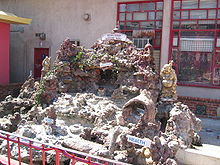Wishing well

A wishing well is a term from European folklore to describe wells where it was thought that any spoken wish would be granted. The idea that a wish would be granted came from the idea that water housed deities or had been placed there as a gift from the gods, since water was a source of life and often a scarce commodity.
The Germanic and Celtic peoples considered springs and wells sacred places.[1] Sometimes the places were marked with wooden statues possibly of the god associated with the pool. Germanic peoples were known to throw the armour and weapons of defeated enemies into bogs and other pools of water as offerings to their gods.[2] [3]
Water was seen to have healing powers and therefore wells became popular with many people drinking, bathing or just simply wishing over it. People believe that the guardians or dwellers of the well would grant them their wish if they paid a price. After uttering the wish, one would generally drop coins in the well. That wish would then be granted by the guardian or dweller, based upon how the coin would land at the bottom of the well. Traditionally coins were made of copper or silver and had biocidal properties which kept the water from going sour (bacteria produces various acidic compounds which affect the taste, notably Hydrogen sulfide). It was thus lucky to throw coins in the well.
The tradition of dropping pennies in ponds and fountains stems from this. Coins would be placed there as gifts for the deity to show appreciation.
In November 2006 the "Fountain Money Mountain" reported that tourists throw just under 3 million pounds per year into wishing wells[1].
This may be a left over from ancient mythology such as Mímir's Well from Nordic myths, also known as the ¨Well of Wisdom¨, a Well that could grant you infinite wisdom provided you sacrificed something you held dear. Odin was asked to sacrifice his right eye which he threw into the well to receive not only the wisdom of seeing the future but the understanding of why things must be. Mirmir is the Nordic god of wisdom, and his well sits at the roots of Yggdrasil, the World Tree which draws its water from the well.
In Popular Culture
There are separate songs named Wishing Well by Terence Trent D'Arby, Black Sabbath, Bob Mould, The Lyndsay Diaries, Monte Montgomery, Hank Snow, Free, Paul Rodgers, Jake La Botz and The Airborne Toxic Event.
A celebrated wishing well, the Upwey Wishing Well, is situated just north of Weymouth, England.
The most famous "wishing well" in popular culture is the one featured in Disney's Snow White.
